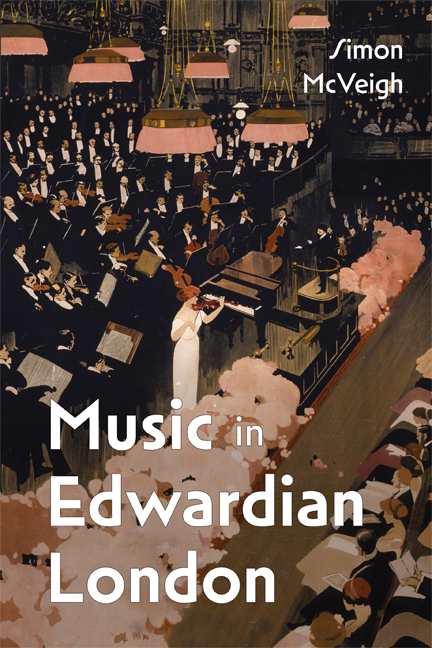Book contents
- Frontmatter
- Dedication
- Contents
- List of Illustrations
- Preface
- 1 Edwardian Soundscapes
- 2 Mapping a Musical City: Place (and Class)
- 3 Mapping a Musical City: Time (and Taste)
- 4 London as Musical Hub: Europe, America, Empire
- 5 The British Question
- 6 Britain and ‘Others’
- 7 Hidden Voices
- 8 From Battersea to Bermondsey: Suburban Music and Local Politics
- 9 London’s Music: An Overview
- Sources and Bibliography
- Index
- Miscellaneous Endmatter
3 - Mapping a Musical City: Time (and Taste)
Published online by Cambridge University Press: 09 May 2024
- Frontmatter
- Dedication
- Contents
- List of Illustrations
- Preface
- 1 Edwardian Soundscapes
- 2 Mapping a Musical City: Place (and Class)
- 3 Mapping a Musical City: Time (and Taste)
- 4 London as Musical Hub: Europe, America, Empire
- 5 The British Question
- 6 Britain and ‘Others’
- 7 Hidden Voices
- 8 From Battersea to Bermondsey: Suburban Music and Local Politics
- 9 London’s Music: An Overview
- Sources and Bibliography
- Index
- Miscellaneous Endmatter
Summary
This second mapping takes a chronological view, offering a perspective on changing patterns of musical organisation, repertoire and – by implication – taste. We’ll examine snapshots of four equally spaced seasons, not only to provide some orientation, but also to create a sense of ‘lived experience’ across the extraordinary variety of music on offer.
❧ Looking back and looking forward: the 1897–98 season
Let's first consider a season at the tail-end of the century, by which time the broad outline of the London theatre and concert calendar was well established.
This season saw a massive celebration of the life and reign of Queen Victoria, an unmistakeable assertion of both national heritage and imperial power. Her diamond jubilee on 22 June 1897 was an occasion for all manner of music – most memorably a Te Deum on the steps of St Paul’s, after which a vast crowd joined in the Old Hundredth. Many commentators described the emotion overwhelming the assembly, including the queen herself, at this ‘simple but beautiful thank-offering of song and prayer’.1 But this was only the formal highpoint of an outpouring of national sentiment. At the Alhambra, Sullivan's ballet Victoria and Merrie England ran for six months from 25 May: on opening night, the coronation scene received three curtain calls – something not normally permitted – while a film of the jubilee procession was later tagged on as a bonus.
WAGNER AND MUSICAL COMEDY
Yet musical life was simultaneously evolving in very different directions, during a period of upheaval anticipating the new spirit of the 1900s. If Shaw in 1893 had disgustedly asserted that London music was dying, driven only by force of habit, four years later London's movers and shakers were avidly seeking novel sensations, eyeing continental Europe and mining untapped audiences.
Three elements stand out, the first being the towering figure of Wagner. The British relationship with Wagner had got off to a rocky start in 1855, an impression only slightly ameliorated by the 1877 Albert Hall concerts in aid of his shaky finances. But as performances escalated during the 1880s, and as the aesthetic movement joined forces with a wave of popular enthusiasm, the floodgates opened.
- Type
- Chapter
- Information
- Music in Edwardian London , pp. 59 - 99Publisher: Boydell & BrewerPrint publication year: 2024



